CAS203 Report: Ethical Principles, Case Management, and Funding
VerifiedAdded on 2022/10/10
|9
|2384
|135
Report
AI Summary
This report analyzes a case study involving a 14-year-old named Max, who faces discrimination, physical abuse, and threats due to his sexual orientation. The report explores the ethical dilemmas faced by a community worker, Andrew, in balancing confidentiality and the duty of care. It examines the ethical principles of organizations like ACWA, and the case management process. The report also outlines the role of support organizations, such as LGBTQIA+ support services and Beyond Blue, in assisting individuals facing similar challenges. Furthermore, it details available resources, funding mechanisms, and the case management process. The report concludes with a discussion of group contributions and individual efforts in the research and report preparation, highlighting collaborative teamwork and the assignment's impact on understanding community services and ethical considerations.
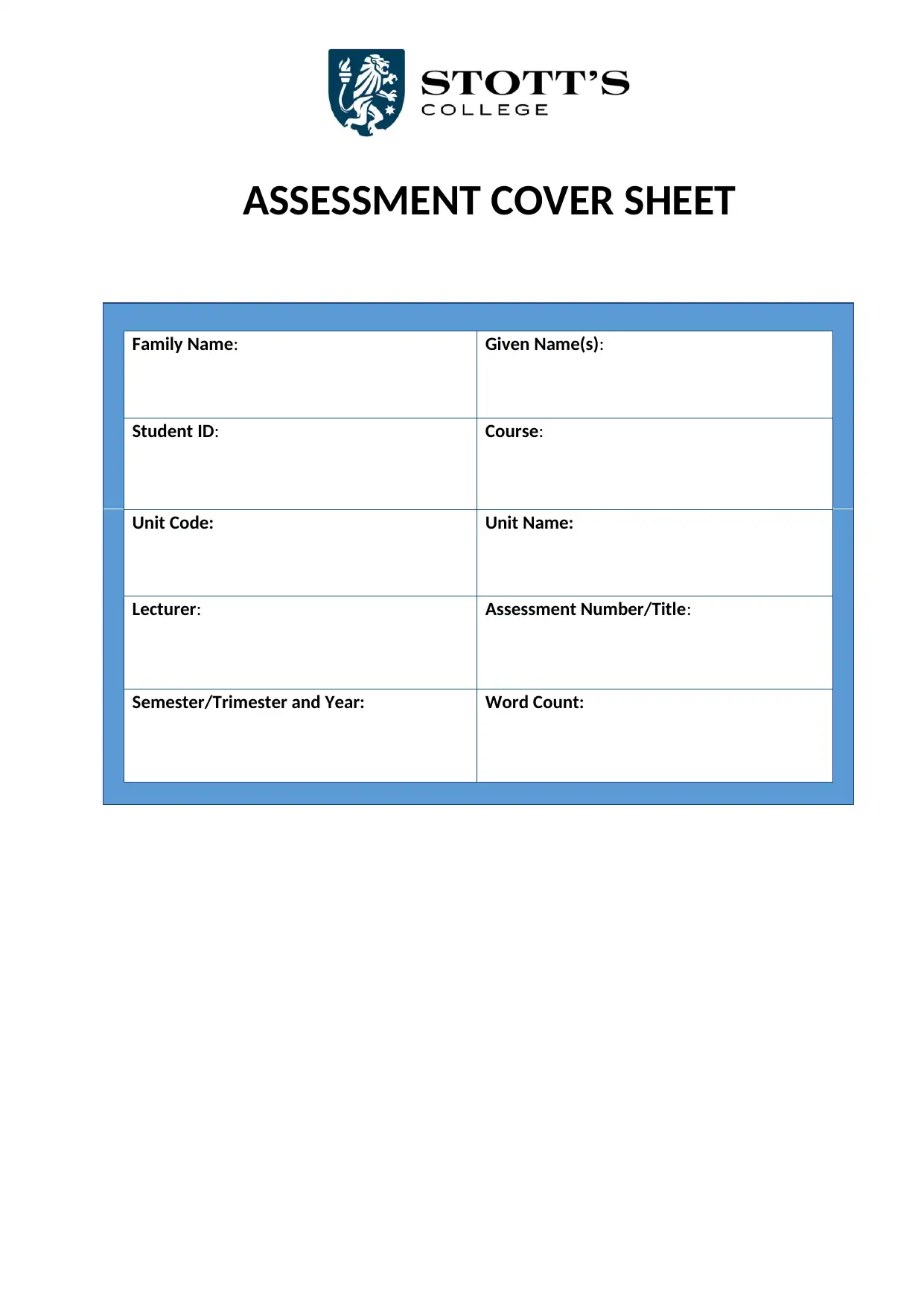
ASSESSMENT COVER SHEET
Family Name: Given Name(s):
Student ID: Course:
Unit Code: Unit Name:
Lecturer: Assessment Number/Title:
Semester/Trimester and Year: Word Count:
Family Name: Given Name(s):
Student ID: Course:
Unit Code: Unit Name:
Lecturer: Assessment Number/Title:
Semester/Trimester and Year: Word Count:
Paraphrase This Document
Need a fresh take? Get an instant paraphrase of this document with our AI Paraphraser
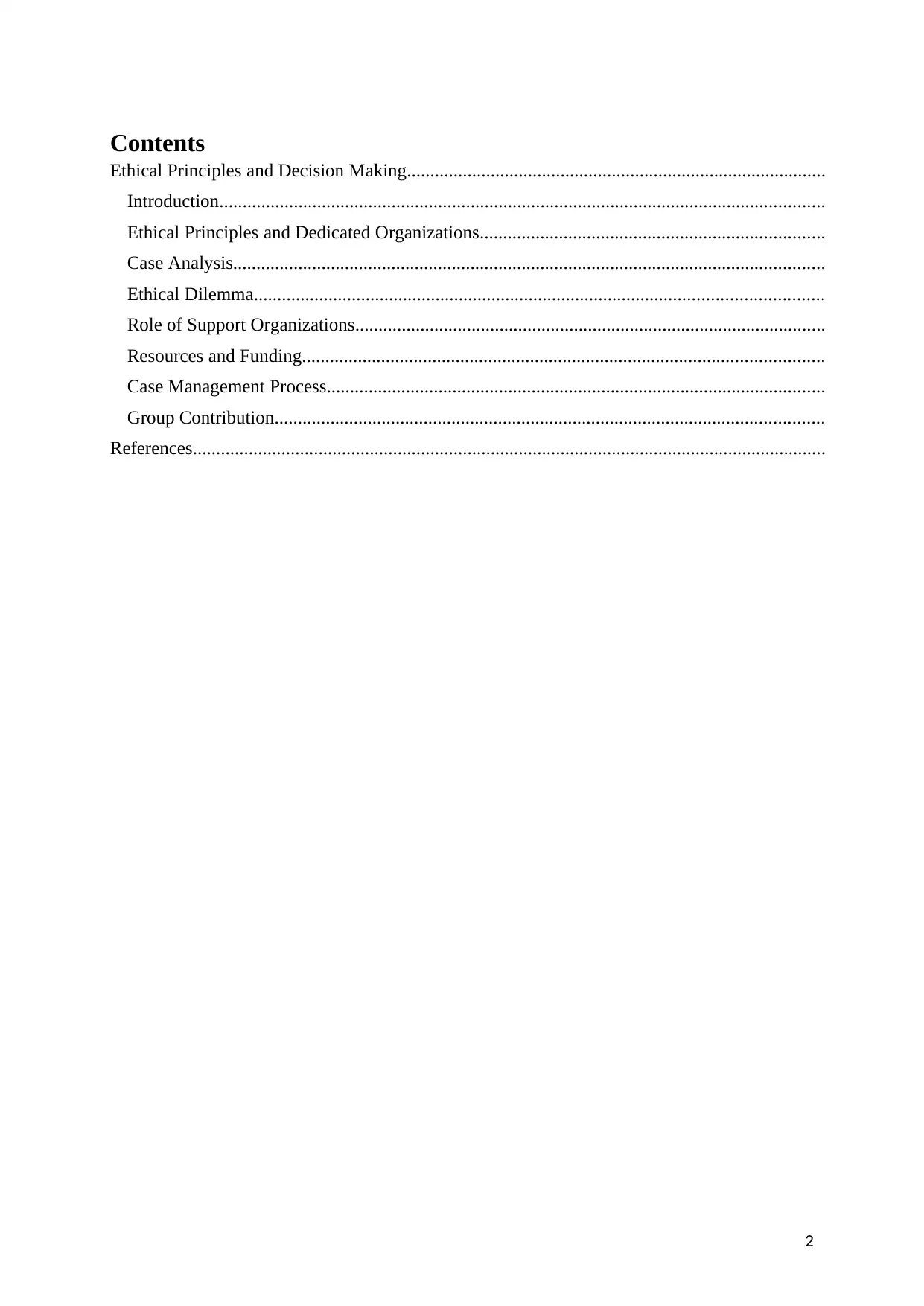
Contents
Ethical Principles and Decision Making..........................................................................................
Introduction..................................................................................................................................
Ethical Principles and Dedicated Organizations..........................................................................
Case Analysis...............................................................................................................................
Ethical Dilemma..........................................................................................................................
Role of Support Organizations.....................................................................................................
Resources and Funding................................................................................................................
Case Management Process...........................................................................................................
Group Contribution......................................................................................................................
References........................................................................................................................................
2
Ethical Principles and Decision Making..........................................................................................
Introduction..................................................................................................................................
Ethical Principles and Dedicated Organizations..........................................................................
Case Analysis...............................................................................................................................
Ethical Dilemma..........................................................................................................................
Role of Support Organizations.....................................................................................................
Resources and Funding................................................................................................................
Case Management Process...........................................................................................................
Group Contribution......................................................................................................................
References........................................................................................................................................
2
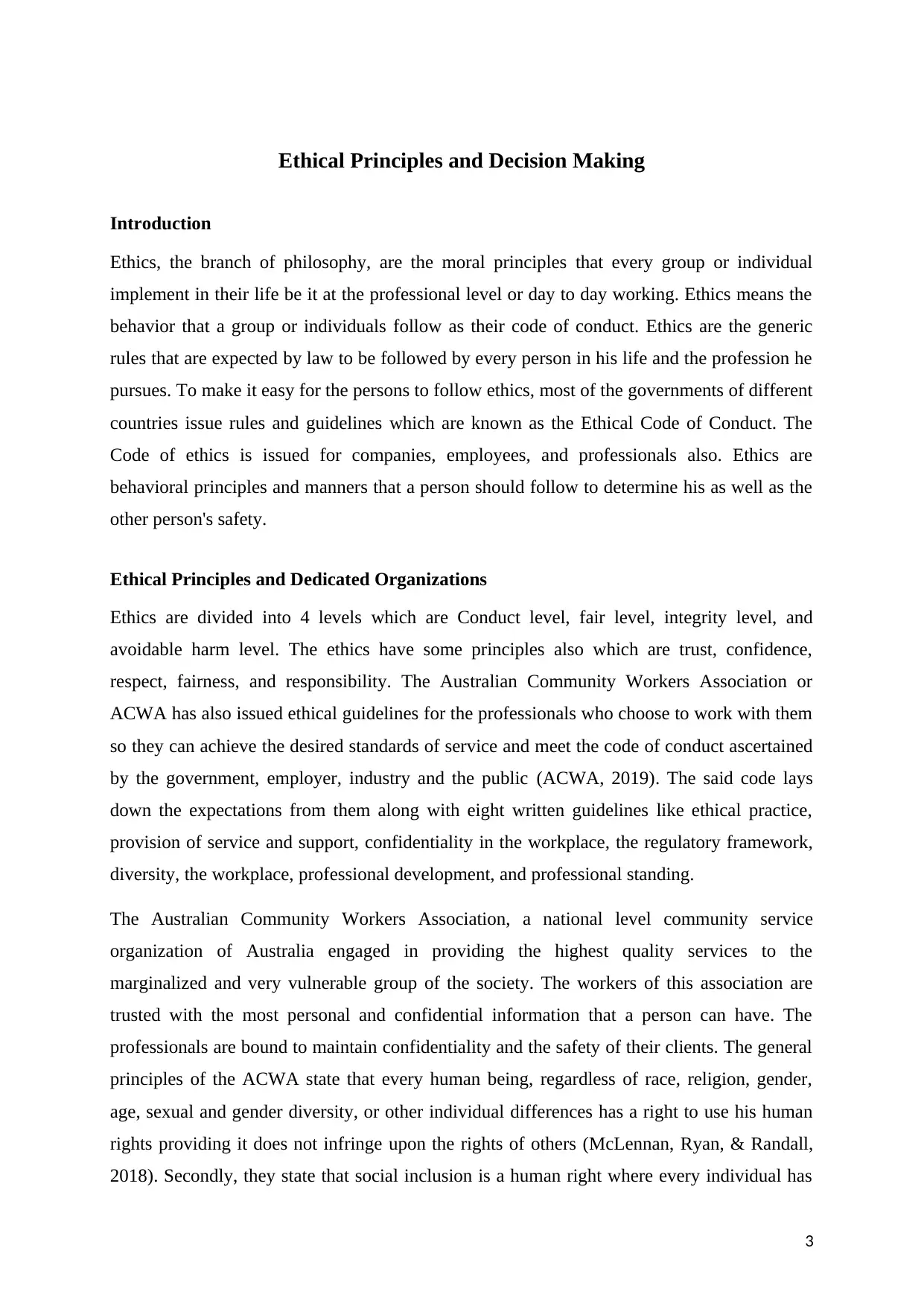
Ethical Principles and Decision Making
Introduction
Ethics, the branch of philosophy, are the moral principles that every group or individual
implement in their life be it at the professional level or day to day working. Ethics means the
behavior that a group or individuals follow as their code of conduct. Ethics are the generic
rules that are expected by law to be followed by every person in his life and the profession he
pursues. To make it easy for the persons to follow ethics, most of the governments of different
countries issue rules and guidelines which are known as the Ethical Code of Conduct. The
Code of ethics is issued for companies, employees, and professionals also. Ethics are
behavioral principles and manners that a person should follow to determine his as well as the
other person's safety.
Ethical Principles and Dedicated Organizations
Ethics are divided into 4 levels which are Conduct level, fair level, integrity level, and
avoidable harm level. The ethics have some principles also which are trust, confidence,
respect, fairness, and responsibility. The Australian Community Workers Association or
ACWA has also issued ethical guidelines for the professionals who choose to work with them
so they can achieve the desired standards of service and meet the code of conduct ascertained
by the government, employer, industry and the public (ACWA, 2019). The said code lays
down the expectations from them along with eight written guidelines like ethical practice,
provision of service and support, confidentiality in the workplace, the regulatory framework,
diversity, the workplace, professional development, and professional standing.
The Australian Community Workers Association, a national level community service
organization of Australia engaged in providing the highest quality services to the
marginalized and very vulnerable group of the society. The workers of this association are
trusted with the most personal and confidential information that a person can have. The
professionals are bound to maintain confidentiality and the safety of their clients. The general
principles of the ACWA state that every human being, regardless of race, religion, gender,
age, sexual and gender diversity, or other individual differences has a right to use his human
rights providing it does not infringe upon the rights of others (McLennan, Ryan, & Randall,
2018). Secondly, they state that social inclusion is a human right where every individual has
3
Introduction
Ethics, the branch of philosophy, are the moral principles that every group or individual
implement in their life be it at the professional level or day to day working. Ethics means the
behavior that a group or individuals follow as their code of conduct. Ethics are the generic
rules that are expected by law to be followed by every person in his life and the profession he
pursues. To make it easy for the persons to follow ethics, most of the governments of different
countries issue rules and guidelines which are known as the Ethical Code of Conduct. The
Code of ethics is issued for companies, employees, and professionals also. Ethics are
behavioral principles and manners that a person should follow to determine his as well as the
other person's safety.
Ethical Principles and Dedicated Organizations
Ethics are divided into 4 levels which are Conduct level, fair level, integrity level, and
avoidable harm level. The ethics have some principles also which are trust, confidence,
respect, fairness, and responsibility. The Australian Community Workers Association or
ACWA has also issued ethical guidelines for the professionals who choose to work with them
so they can achieve the desired standards of service and meet the code of conduct ascertained
by the government, employer, industry and the public (ACWA, 2019). The said code lays
down the expectations from them along with eight written guidelines like ethical practice,
provision of service and support, confidentiality in the workplace, the regulatory framework,
diversity, the workplace, professional development, and professional standing.
The Australian Community Workers Association, a national level community service
organization of Australia engaged in providing the highest quality services to the
marginalized and very vulnerable group of the society. The workers of this association are
trusted with the most personal and confidential information that a person can have. The
professionals are bound to maintain confidentiality and the safety of their clients. The general
principles of the ACWA state that every human being, regardless of race, religion, gender,
age, sexual and gender diversity, or other individual differences has a right to use his human
rights providing it does not infringe upon the rights of others (McLennan, Ryan, & Randall,
2018). Secondly, they state that social inclusion is a human right where every individual has
3
⊘ This is a preview!⊘
Do you want full access?
Subscribe today to unlock all pages.

Trusted by 1+ million students worldwide
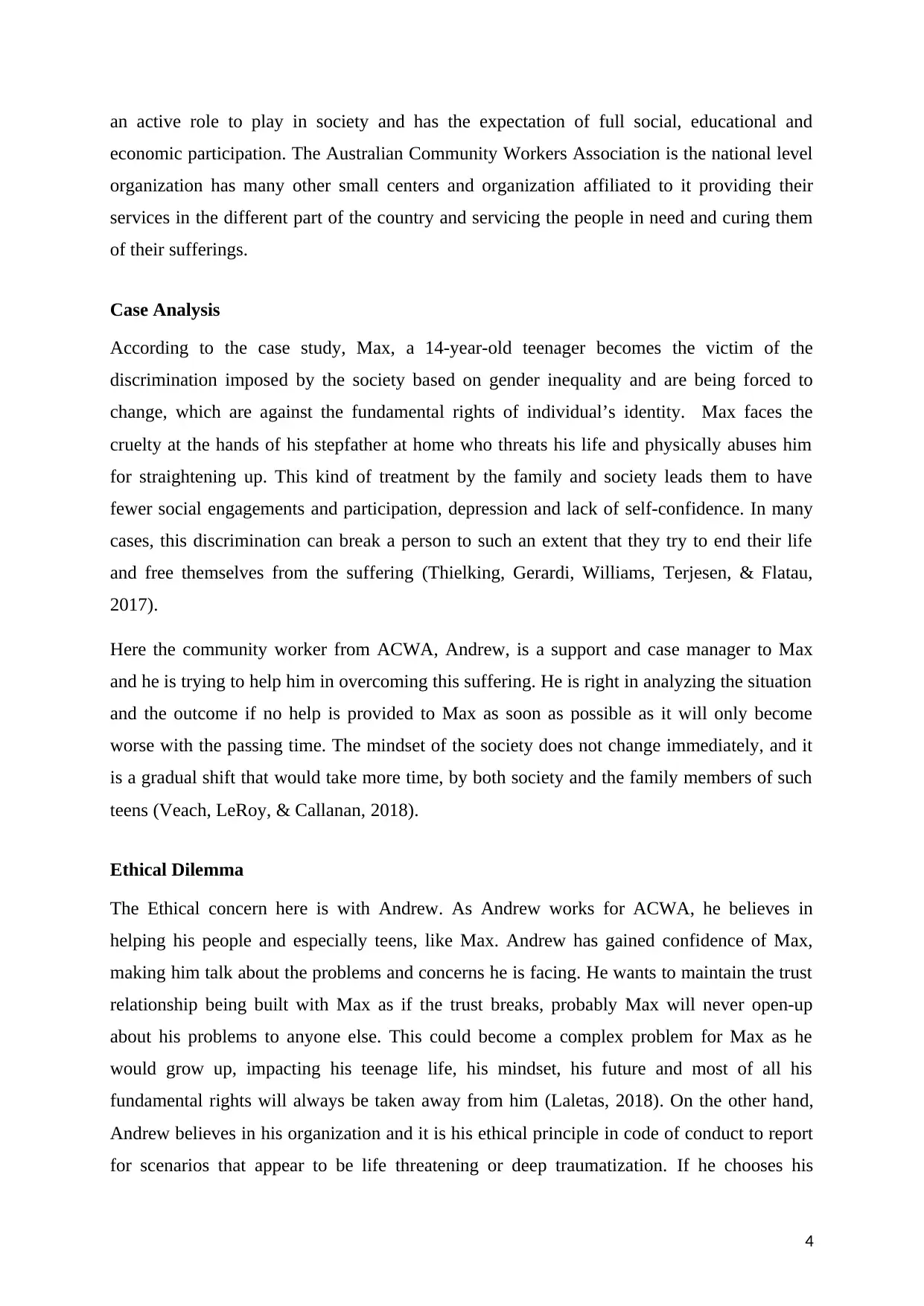
an active role to play in society and has the expectation of full social, educational and
economic participation. The Australian Community Workers Association is the national level
organization has many other small centers and organization affiliated to it providing their
services in the different part of the country and servicing the people in need and curing them
of their sufferings.
Case Analysis
According to the case study, Max, a 14-year-old teenager becomes the victim of the
discrimination imposed by the society based on gender inequality and are being forced to
change, which are against the fundamental rights of individual’s identity. Max faces the
cruelty at the hands of his stepfather at home who threats his life and physically abuses him
for straightening up. This kind of treatment by the family and society leads them to have
fewer social engagements and participation, depression and lack of self-confidence. In many
cases, this discrimination can break a person to such an extent that they try to end their life
and free themselves from the suffering (Thielking, Gerardi, Williams, Terjesen, & Flatau,
2017).
Here the community worker from ACWA, Andrew, is a support and case manager to Max
and he is trying to help him in overcoming this suffering. He is right in analyzing the situation
and the outcome if no help is provided to Max as soon as possible as it will only become
worse with the passing time. The mindset of the society does not change immediately, and it
is a gradual shift that would take more time, by both society and the family members of such
teens (Veach, LeRoy, & Callanan, 2018).
Ethical Dilemma
The Ethical concern here is with Andrew. As Andrew works for ACWA, he believes in
helping his people and especially teens, like Max. Andrew has gained confidence of Max,
making him talk about the problems and concerns he is facing. He wants to maintain the trust
relationship being built with Max as if the trust breaks, probably Max will never open-up
about his problems to anyone else. This could become a complex problem for Max as he
would grow up, impacting his teenage life, his mindset, his future and most of all his
fundamental rights will always be taken away from him (Laletas, 2018). On the other hand,
Andrew believes in his organization and it is his ethical principle in code of conduct to report
for scenarios that appear to be life threatening or deep traumatization. If he chooses his
4
economic participation. The Australian Community Workers Association is the national level
organization has many other small centers and organization affiliated to it providing their
services in the different part of the country and servicing the people in need and curing them
of their sufferings.
Case Analysis
According to the case study, Max, a 14-year-old teenager becomes the victim of the
discrimination imposed by the society based on gender inequality and are being forced to
change, which are against the fundamental rights of individual’s identity. Max faces the
cruelty at the hands of his stepfather at home who threats his life and physically abuses him
for straightening up. This kind of treatment by the family and society leads them to have
fewer social engagements and participation, depression and lack of self-confidence. In many
cases, this discrimination can break a person to such an extent that they try to end their life
and free themselves from the suffering (Thielking, Gerardi, Williams, Terjesen, & Flatau,
2017).
Here the community worker from ACWA, Andrew, is a support and case manager to Max
and he is trying to help him in overcoming this suffering. He is right in analyzing the situation
and the outcome if no help is provided to Max as soon as possible as it will only become
worse with the passing time. The mindset of the society does not change immediately, and it
is a gradual shift that would take more time, by both society and the family members of such
teens (Veach, LeRoy, & Callanan, 2018).
Ethical Dilemma
The Ethical concern here is with Andrew. As Andrew works for ACWA, he believes in
helping his people and especially teens, like Max. Andrew has gained confidence of Max,
making him talk about the problems and concerns he is facing. He wants to maintain the trust
relationship being built with Max as if the trust breaks, probably Max will never open-up
about his problems to anyone else. This could become a complex problem for Max as he
would grow up, impacting his teenage life, his mindset, his future and most of all his
fundamental rights will always be taken away from him (Laletas, 2018). On the other hand,
Andrew believes in his organization and it is his ethical principle in code of conduct to report
for scenarios that appear to be life threatening or deep traumatization. If he chooses his
4
Paraphrase This Document
Need a fresh take? Get an instant paraphrase of this document with our AI Paraphraser
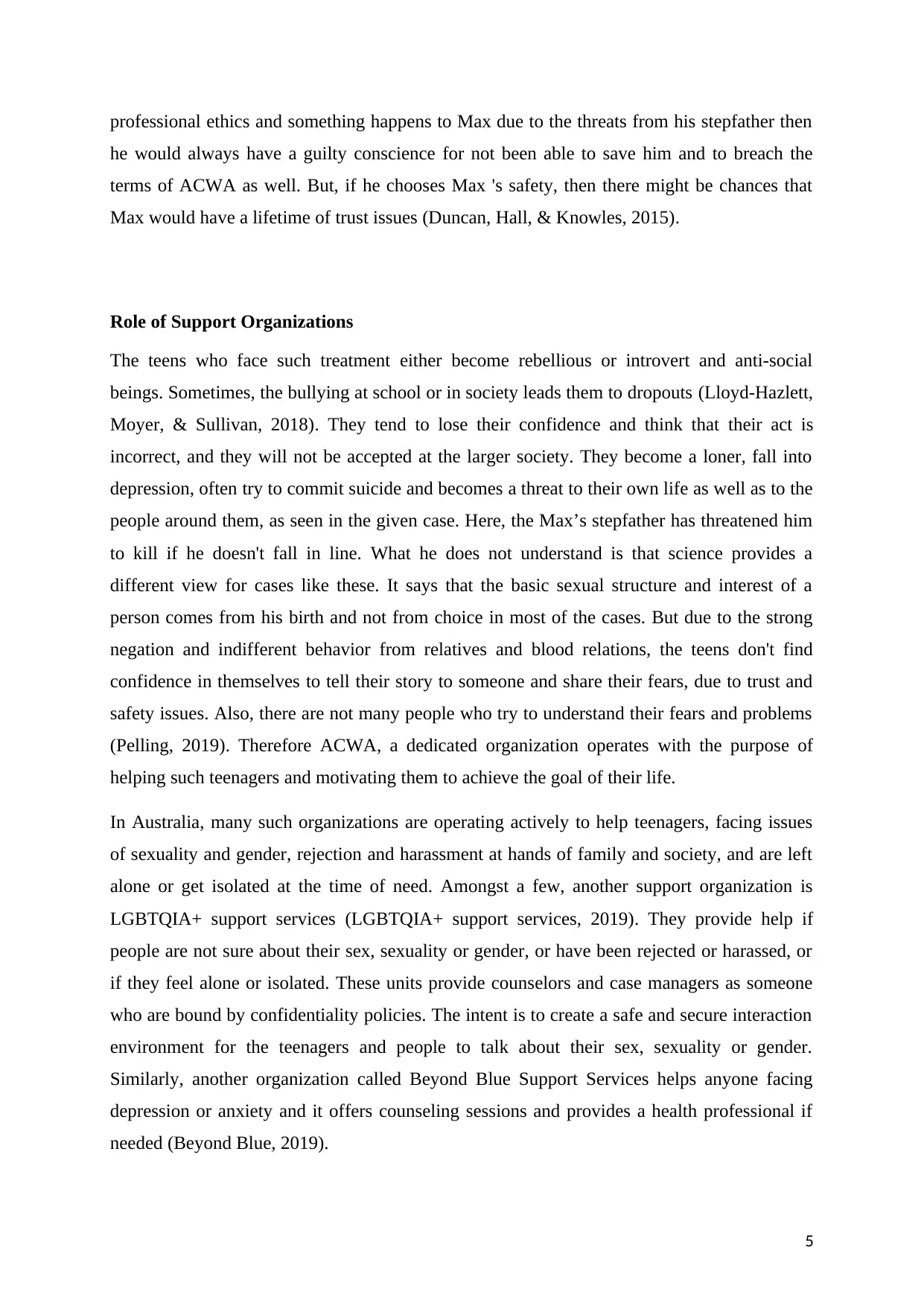
professional ethics and something happens to Max due to the threats from his stepfather then
he would always have a guilty conscience for not been able to save him and to breach the
terms of ACWA as well. But, if he chooses Max 's safety, then there might be chances that
Max would have a lifetime of trust issues (Duncan, Hall, & Knowles, 2015).
Role of Support Organizations
The teens who face such treatment either become rebellious or introvert and anti-social
beings. Sometimes, the bullying at school or in society leads them to dropouts (Lloyd-Hazlett,
Moyer, & Sullivan, 2018). They tend to lose their confidence and think that their act is
incorrect, and they will not be accepted at the larger society. They become a loner, fall into
depression, often try to commit suicide and becomes a threat to their own life as well as to the
people around them, as seen in the given case. Here, the Max’s stepfather has threatened him
to kill if he doesn't fall in line. What he does not understand is that science provides a
different view for cases like these. It says that the basic sexual structure and interest of a
person comes from his birth and not from choice in most of the cases. But due to the strong
negation and indifferent behavior from relatives and blood relations, the teens don't find
confidence in themselves to tell their story to someone and share their fears, due to trust and
safety issues. Also, there are not many people who try to understand their fears and problems
(Pelling, 2019). Therefore ACWA, a dedicated organization operates with the purpose of
helping such teenagers and motivating them to achieve the goal of their life.
In Australia, many such organizations are operating actively to help teenagers, facing issues
of sexuality and gender, rejection and harassment at hands of family and society, and are left
alone or get isolated at the time of need. Amongst a few, another support organization is
LGBTQIA+ support services (LGBTQIA+ support services, 2019). They provide help if
people are not sure about their sex, sexuality or gender, or have been rejected or harassed, or
if they feel alone or isolated. These units provide counselors and case managers as someone
who are bound by confidentiality policies. The intent is to create a safe and secure interaction
environment for the teenagers and people to talk about their sex, sexuality or gender.
Similarly, another organization called Beyond Blue Support Services helps anyone facing
depression or anxiety and it offers counseling sessions and provides a health professional if
needed (Beyond Blue, 2019).
5
he would always have a guilty conscience for not been able to save him and to breach the
terms of ACWA as well. But, if he chooses Max 's safety, then there might be chances that
Max would have a lifetime of trust issues (Duncan, Hall, & Knowles, 2015).
Role of Support Organizations
The teens who face such treatment either become rebellious or introvert and anti-social
beings. Sometimes, the bullying at school or in society leads them to dropouts (Lloyd-Hazlett,
Moyer, & Sullivan, 2018). They tend to lose their confidence and think that their act is
incorrect, and they will not be accepted at the larger society. They become a loner, fall into
depression, often try to commit suicide and becomes a threat to their own life as well as to the
people around them, as seen in the given case. Here, the Max’s stepfather has threatened him
to kill if he doesn't fall in line. What he does not understand is that science provides a
different view for cases like these. It says that the basic sexual structure and interest of a
person comes from his birth and not from choice in most of the cases. But due to the strong
negation and indifferent behavior from relatives and blood relations, the teens don't find
confidence in themselves to tell their story to someone and share their fears, due to trust and
safety issues. Also, there are not many people who try to understand their fears and problems
(Pelling, 2019). Therefore ACWA, a dedicated organization operates with the purpose of
helping such teenagers and motivating them to achieve the goal of their life.
In Australia, many such organizations are operating actively to help teenagers, facing issues
of sexuality and gender, rejection and harassment at hands of family and society, and are left
alone or get isolated at the time of need. Amongst a few, another support organization is
LGBTQIA+ support services (LGBTQIA+ support services, 2019). They provide help if
people are not sure about their sex, sexuality or gender, or have been rejected or harassed, or
if they feel alone or isolated. These units provide counselors and case managers as someone
who are bound by confidentiality policies. The intent is to create a safe and secure interaction
environment for the teenagers and people to talk about their sex, sexuality or gender.
Similarly, another organization called Beyond Blue Support Services helps anyone facing
depression or anxiety and it offers counseling sessions and provides a health professional if
needed (Beyond Blue, 2019).
5
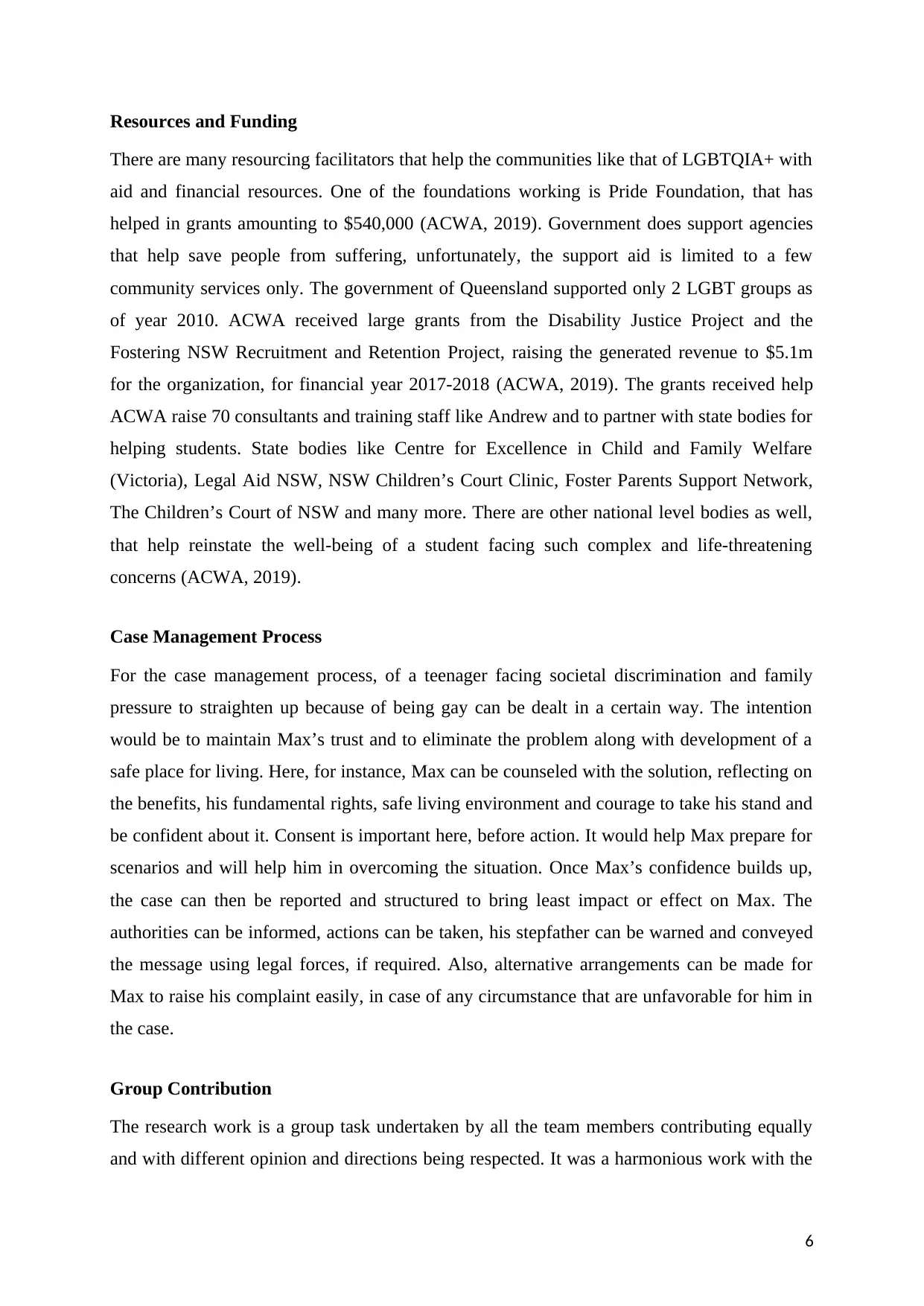
Resources and Funding
There are many resourcing facilitators that help the communities like that of LGBTQIA+ with
aid and financial resources. One of the foundations working is Pride Foundation, that has
helped in grants amounting to $540,000 (ACWA, 2019). Government does support agencies
that help save people from suffering, unfortunately, the support aid is limited to a few
community services only. The government of Queensland supported only 2 LGBT groups as
of year 2010. ACWA received large grants from the Disability Justice Project and the
Fostering NSW Recruitment and Retention Project, raising the generated revenue to $5.1m
for the organization, for financial year 2017-2018 (ACWA, 2019). The grants received help
ACWA raise 70 consultants and training staff like Andrew and to partner with state bodies for
helping students. State bodies like Centre for Excellence in Child and Family Welfare
(Victoria), Legal Aid NSW, NSW Children’s Court Clinic, Foster Parents Support Network,
The Children’s Court of NSW and many more. There are other national level bodies as well,
that help reinstate the well-being of a student facing such complex and life-threatening
concerns (ACWA, 2019).
Case Management Process
For the case management process, of a teenager facing societal discrimination and family
pressure to straighten up because of being gay can be dealt in a certain way. The intention
would be to maintain Max’s trust and to eliminate the problem along with development of a
safe place for living. Here, for instance, Max can be counseled with the solution, reflecting on
the benefits, his fundamental rights, safe living environment and courage to take his stand and
be confident about it. Consent is important here, before action. It would help Max prepare for
scenarios and will help him in overcoming the situation. Once Max’s confidence builds up,
the case can then be reported and structured to bring least impact or effect on Max. The
authorities can be informed, actions can be taken, his stepfather can be warned and conveyed
the message using legal forces, if required. Also, alternative arrangements can be made for
Max to raise his complaint easily, in case of any circumstance that are unfavorable for him in
the case.
Group Contribution
The research work is a group task undertaken by all the team members contributing equally
and with different opinion and directions being respected. It was a harmonious work with the
6
There are many resourcing facilitators that help the communities like that of LGBTQIA+ with
aid and financial resources. One of the foundations working is Pride Foundation, that has
helped in grants amounting to $540,000 (ACWA, 2019). Government does support agencies
that help save people from suffering, unfortunately, the support aid is limited to a few
community services only. The government of Queensland supported only 2 LGBT groups as
of year 2010. ACWA received large grants from the Disability Justice Project and the
Fostering NSW Recruitment and Retention Project, raising the generated revenue to $5.1m
for the organization, for financial year 2017-2018 (ACWA, 2019). The grants received help
ACWA raise 70 consultants and training staff like Andrew and to partner with state bodies for
helping students. State bodies like Centre for Excellence in Child and Family Welfare
(Victoria), Legal Aid NSW, NSW Children’s Court Clinic, Foster Parents Support Network,
The Children’s Court of NSW and many more. There are other national level bodies as well,
that help reinstate the well-being of a student facing such complex and life-threatening
concerns (ACWA, 2019).
Case Management Process
For the case management process, of a teenager facing societal discrimination and family
pressure to straighten up because of being gay can be dealt in a certain way. The intention
would be to maintain Max’s trust and to eliminate the problem along with development of a
safe place for living. Here, for instance, Max can be counseled with the solution, reflecting on
the benefits, his fundamental rights, safe living environment and courage to take his stand and
be confident about it. Consent is important here, before action. It would help Max prepare for
scenarios and will help him in overcoming the situation. Once Max’s confidence builds up,
the case can then be reported and structured to bring least impact or effect on Max. The
authorities can be informed, actions can be taken, his stepfather can be warned and conveyed
the message using legal forces, if required. Also, alternative arrangements can be made for
Max to raise his complaint easily, in case of any circumstance that are unfavorable for him in
the case.
Group Contribution
The research work is a group task undertaken by all the team members contributing equally
and with different opinion and directions being respected. It was a harmonious work with the
6
⊘ This is a preview!⊘
Do you want full access?
Subscribe today to unlock all pages.

Trusted by 1+ million students worldwide
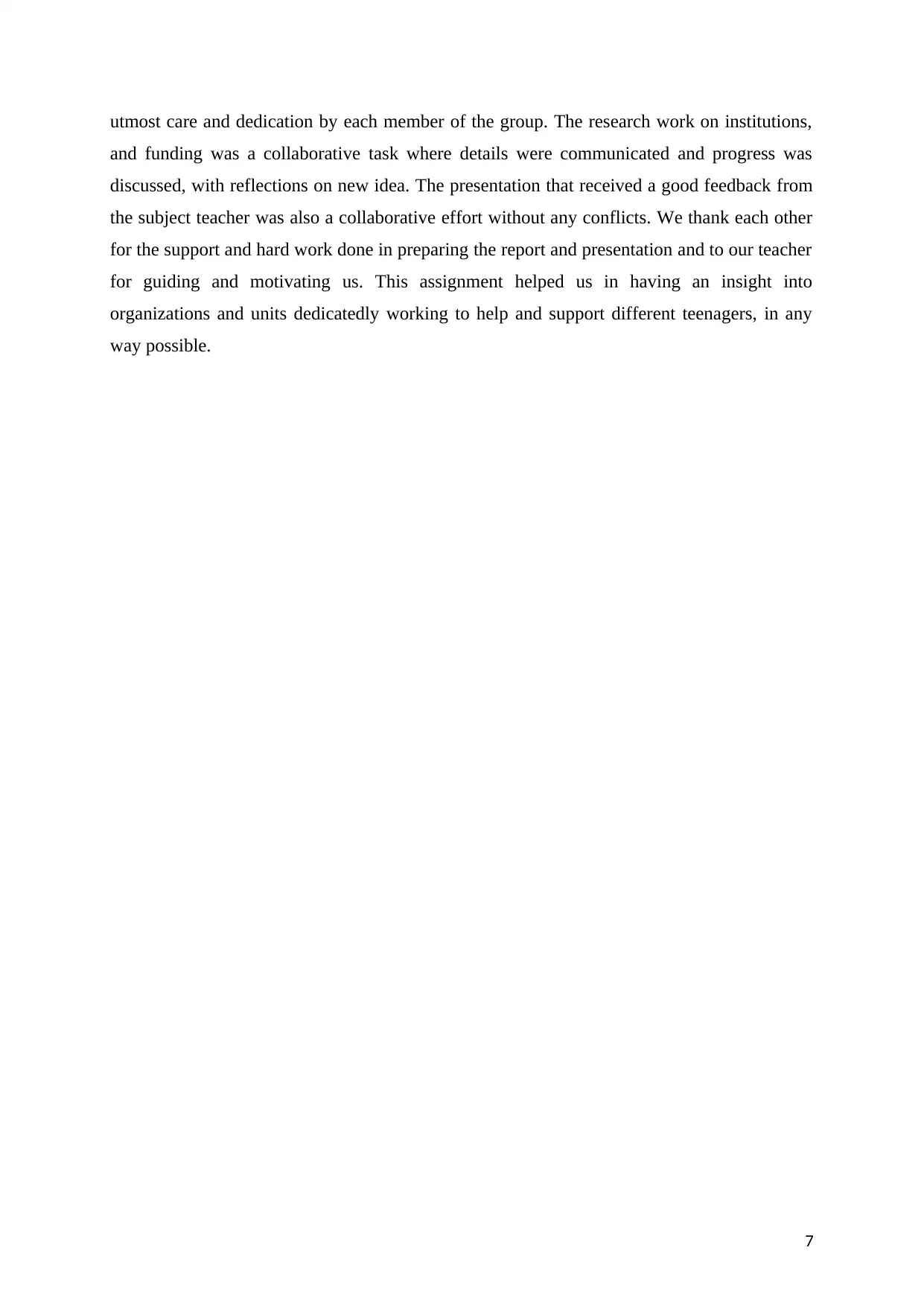
utmost care and dedication by each member of the group. The research work on institutions,
and funding was a collaborative task where details were communicated and progress was
discussed, with reflections on new idea. The presentation that received a good feedback from
the subject teacher was also a collaborative effort without any conflicts. We thank each other
for the support and hard work done in preparing the report and presentation and to our teacher
for guiding and motivating us. This assignment helped us in having an insight into
organizations and units dedicatedly working to help and support different teenagers, in any
way possible.
7
and funding was a collaborative task where details were communicated and progress was
discussed, with reflections on new idea. The presentation that received a good feedback from
the subject teacher was also a collaborative effort without any conflicts. We thank each other
for the support and hard work done in preparing the report and presentation and to our teacher
for guiding and motivating us. This assignment helped us in having an insight into
organizations and units dedicatedly working to help and support different teenagers, in any
way possible.
7
Paraphrase This Document
Need a fresh take? Get an instant paraphrase of this document with our AI Paraphraser
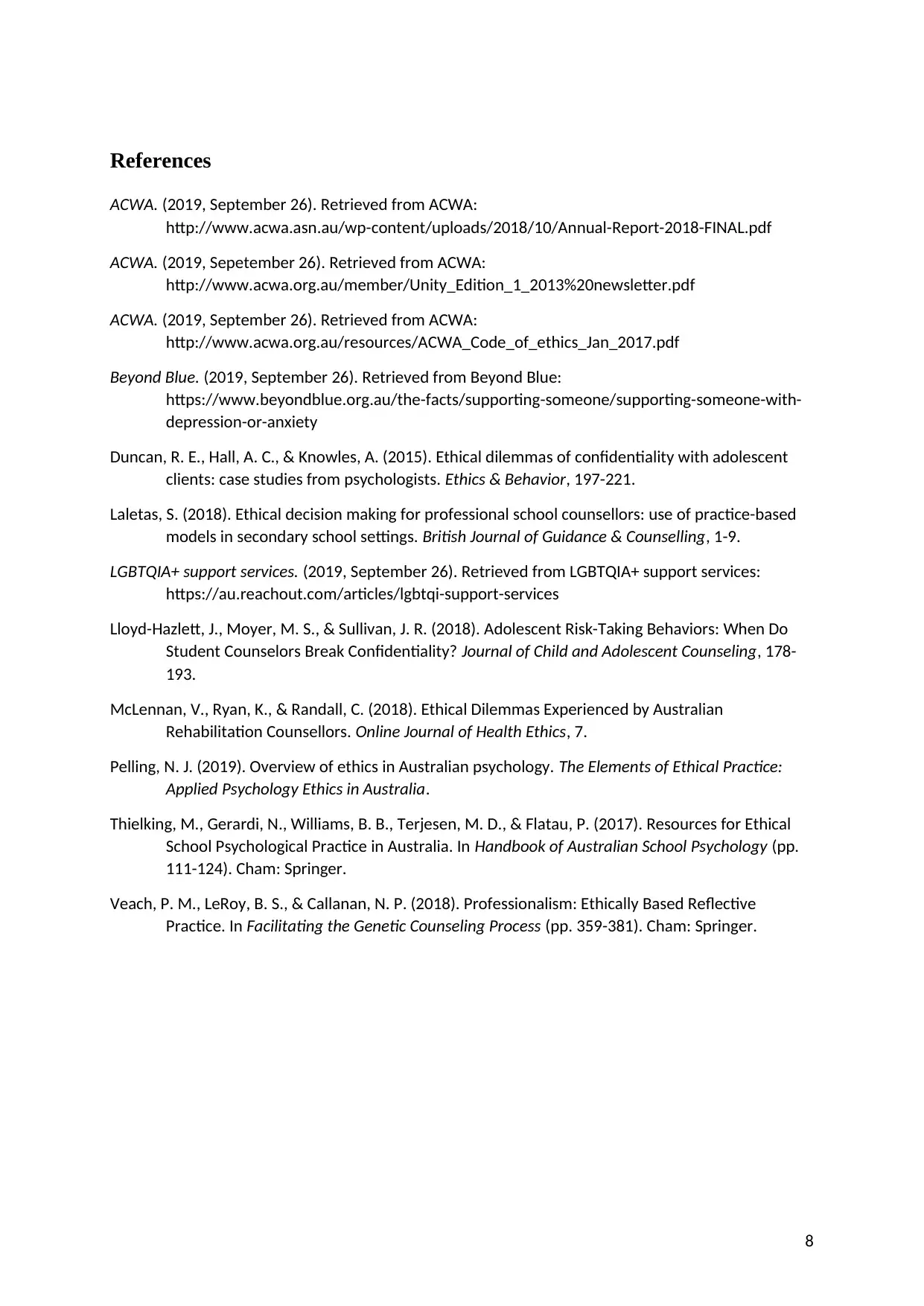
References
ACWA. (2019, September 26). Retrieved from ACWA:
http://www.acwa.asn.au/wp-content/uploads/2018/10/Annual-Report-2018-FINAL.pdf
ACWA. (2019, Sepetember 26). Retrieved from ACWA:
http://www.acwa.org.au/member/Unity_Edition_1_2013%20newsletter.pdf
ACWA. (2019, September 26). Retrieved from ACWA:
http://www.acwa.org.au/resources/ACWA_Code_of_ethics_Jan_2017.pdf
Beyond Blue. (2019, September 26). Retrieved from Beyond Blue:
https://www.beyondblue.org.au/the-facts/supporting-someone/supporting-someone-with-
depression-or-anxiety
Duncan, R. E., Hall, A. C., & Knowles, A. (2015). Ethical dilemmas of confidentiality with adolescent
clients: case studies from psychologists. Ethics & Behavior, 197-221.
Laletas, S. (2018). Ethical decision making for professional school counsellors: use of practice-based
models in secondary school settings. British Journal of Guidance & Counselling, 1-9.
LGBTQIA+ support services. (2019, September 26). Retrieved from LGBTQIA+ support services:
https://au.reachout.com/articles/lgbtqi-support-services
Lloyd-Hazlett, J., Moyer, M. S., & Sullivan, J. R. (2018). Adolescent Risk-Taking Behaviors: When Do
Student Counselors Break Confidentiality? Journal of Child and Adolescent Counseling, 178-
193.
McLennan, V., Ryan, K., & Randall, C. (2018). Ethical Dilemmas Experienced by Australian
Rehabilitation Counsellors. Online Journal of Health Ethics, 7.
Pelling, N. J. (2019). Overview of ethics in Australian psychology. The Elements of Ethical Practice:
Applied Psychology Ethics in Australia.
Thielking, M., Gerardi, N., Williams, B. B., Terjesen, M. D., & Flatau, P. (2017). Resources for Ethical
School Psychological Practice in Australia. In Handbook of Australian School Psychology (pp.
111-124). Cham: Springer.
Veach, P. M., LeRoy, B. S., & Callanan, N. P. (2018). Professionalism: Ethically Based Reflective
Practice. In Facilitating the Genetic Counseling Process (pp. 359-381). Cham: Springer.
8
ACWA. (2019, September 26). Retrieved from ACWA:
http://www.acwa.asn.au/wp-content/uploads/2018/10/Annual-Report-2018-FINAL.pdf
ACWA. (2019, Sepetember 26). Retrieved from ACWA:
http://www.acwa.org.au/member/Unity_Edition_1_2013%20newsletter.pdf
ACWA. (2019, September 26). Retrieved from ACWA:
http://www.acwa.org.au/resources/ACWA_Code_of_ethics_Jan_2017.pdf
Beyond Blue. (2019, September 26). Retrieved from Beyond Blue:
https://www.beyondblue.org.au/the-facts/supporting-someone/supporting-someone-with-
depression-or-anxiety
Duncan, R. E., Hall, A. C., & Knowles, A. (2015). Ethical dilemmas of confidentiality with adolescent
clients: case studies from psychologists. Ethics & Behavior, 197-221.
Laletas, S. (2018). Ethical decision making for professional school counsellors: use of practice-based
models in secondary school settings. British Journal of Guidance & Counselling, 1-9.
LGBTQIA+ support services. (2019, September 26). Retrieved from LGBTQIA+ support services:
https://au.reachout.com/articles/lgbtqi-support-services
Lloyd-Hazlett, J., Moyer, M. S., & Sullivan, J. R. (2018). Adolescent Risk-Taking Behaviors: When Do
Student Counselors Break Confidentiality? Journal of Child and Adolescent Counseling, 178-
193.
McLennan, V., Ryan, K., & Randall, C. (2018). Ethical Dilemmas Experienced by Australian
Rehabilitation Counsellors. Online Journal of Health Ethics, 7.
Pelling, N. J. (2019). Overview of ethics in Australian psychology. The Elements of Ethical Practice:
Applied Psychology Ethics in Australia.
Thielking, M., Gerardi, N., Williams, B. B., Terjesen, M. D., & Flatau, P. (2017). Resources for Ethical
School Psychological Practice in Australia. In Handbook of Australian School Psychology (pp.
111-124). Cham: Springer.
Veach, P. M., LeRoy, B. S., & Callanan, N. P. (2018). Professionalism: Ethically Based Reflective
Practice. In Facilitating the Genetic Counseling Process (pp. 359-381). Cham: Springer.
8

9
⊘ This is a preview!⊘
Do you want full access?
Subscribe today to unlock all pages.

Trusted by 1+ million students worldwide
1 out of 9
Related Documents
Your All-in-One AI-Powered Toolkit for Academic Success.
+13062052269
info@desklib.com
Available 24*7 on WhatsApp / Email
![[object Object]](/_next/static/media/star-bottom.7253800d.svg)
Unlock your academic potential
Copyright © 2020–2026 A2Z Services. All Rights Reserved. Developed and managed by ZUCOL.





